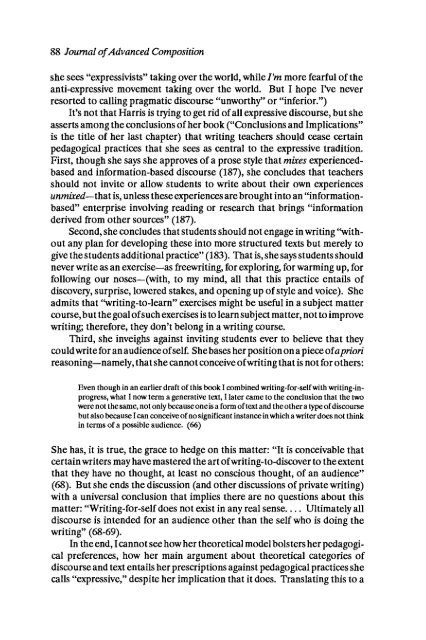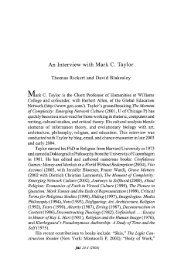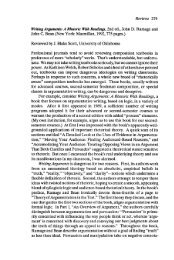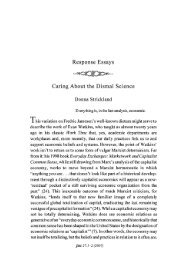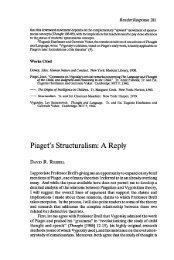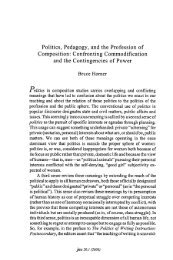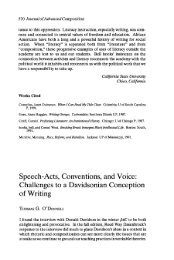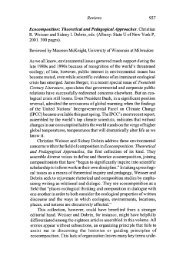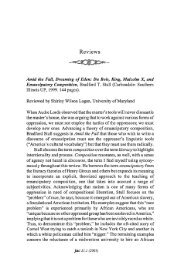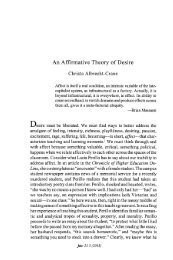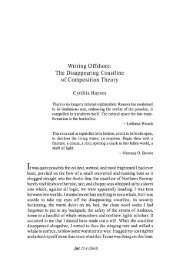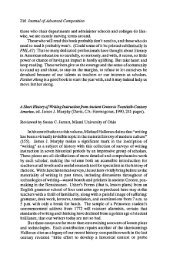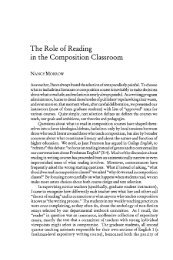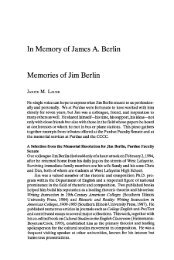Some Thoughts on Expressive Discourse: A Review ... - JAC Online
Some Thoughts on Expressive Discourse: A Review ... - JAC Online
Some Thoughts on Expressive Discourse: A Review ... - JAC Online
You also want an ePaper? Increase the reach of your titles
YUMPU automatically turns print PDFs into web optimized ePapers that Google loves.
88 Journal of Advanced Compositi<strong>on</strong><br />
she sees "expressivists" taking over the world, while I'm more fearful of the<br />
anti-expressive movement taking over the world. But I hope I've never<br />
resorted to calling pragmatic discourse "unworthy" or "inferior.")<br />
It's not that Harris is trying to get rid of all expressive discourse, but she<br />
asserts am<strong>on</strong>g the c<strong>on</strong>clusi<strong>on</strong>s of her book ("C<strong>on</strong>clusi<strong>on</strong>s and Implicati<strong>on</strong>s"<br />
is the title of her last chapter) that writing teachers should cease certain<br />
pedagogical practices that she sees as central to the expressive traditi<strong>on</strong>.<br />
First, though she says she approves of a prose style that mixes experiencedbased<br />
and informati<strong>on</strong>-based discourse (187), she c<strong>on</strong>cludes that teachers<br />
should not invite or allow students to write about their own experiences<br />
unmixed-that is, unless these experiences are brought into an "informati<strong>on</strong>based"<br />
enterprise involving reading or research that brings "informati<strong>on</strong><br />
derived from other sources" (187).<br />
Sec<strong>on</strong>d, she c<strong>on</strong>cludes that students should not engage in writing "without<br />
any plan for developing these into more structured texts but merely to<br />
give the students additi<strong>on</strong>al practice" (183). That is, she says students should<br />
never write as an exercise-as freewriting, for exploring, for warming up, for<br />
following our noses-(with, to my mind, all that this practice entails of<br />
discovery, surprise, lowered stakes, and opening up of style and voice). She<br />
admits that "writing-to-Iearn" exercises might be useful in a subject matter<br />
course, but the goal of such exercises is to learn subject matter, not to improve<br />
writing; therefore, they d<strong>on</strong>'t bel<strong>on</strong>g in a writing course.<br />
Third, she inveighs against inviting students ever to believe that they<br />
could write for an audience of self. She bases her positi<strong>on</strong> <strong>on</strong> a piece ofa priori<br />
reas<strong>on</strong>ing-namely, that she cannot c<strong>on</strong>ceive of writing that is not for others:<br />
Even though in an earlier draft of this book I combined writing-for-selfwith writing-inprogress,<br />
what I now term a generative text, I later came to the c<strong>on</strong>clusi<strong>on</strong> that the two<br />
were not the same, not <strong>on</strong>ly because <strong>on</strong>e is a form of text and the other a type of discourse<br />
but also because I can c<strong>on</strong>ceive of no significant instance in which a writer does not think<br />
in terms of a possible audience. (66)<br />
She has, it is true, the grace to hedge <strong>on</strong> this matter: "It is c<strong>on</strong>ceivable that<br />
certain writers may have mastered the art of writing-to-discover to the extent<br />
that they have no thought, at least no c<strong>on</strong>scious thought, of an audience"<br />
(68). But she ends the discussi<strong>on</strong> (and other discussi<strong>on</strong>s of private writing)<br />
with a universal c<strong>on</strong>clusi<strong>on</strong> that implies there are no questi<strong>on</strong>s about this<br />
matter: "Writing-for-self does not exist in any real sense .... Ultimately all<br />
discourse is intended for an audience other than the self who is doing the<br />
writing" (68-69).<br />
In the end, I cannot see how her theoretical model bolsters her pedagogical<br />
preferences, how her main argument about theoretical categories of<br />
discourse and text entails her prescripti<strong>on</strong>s against pedagogical practices she<br />
calls "expressive," despite her implicati<strong>on</strong> that it does. Translating this to a


